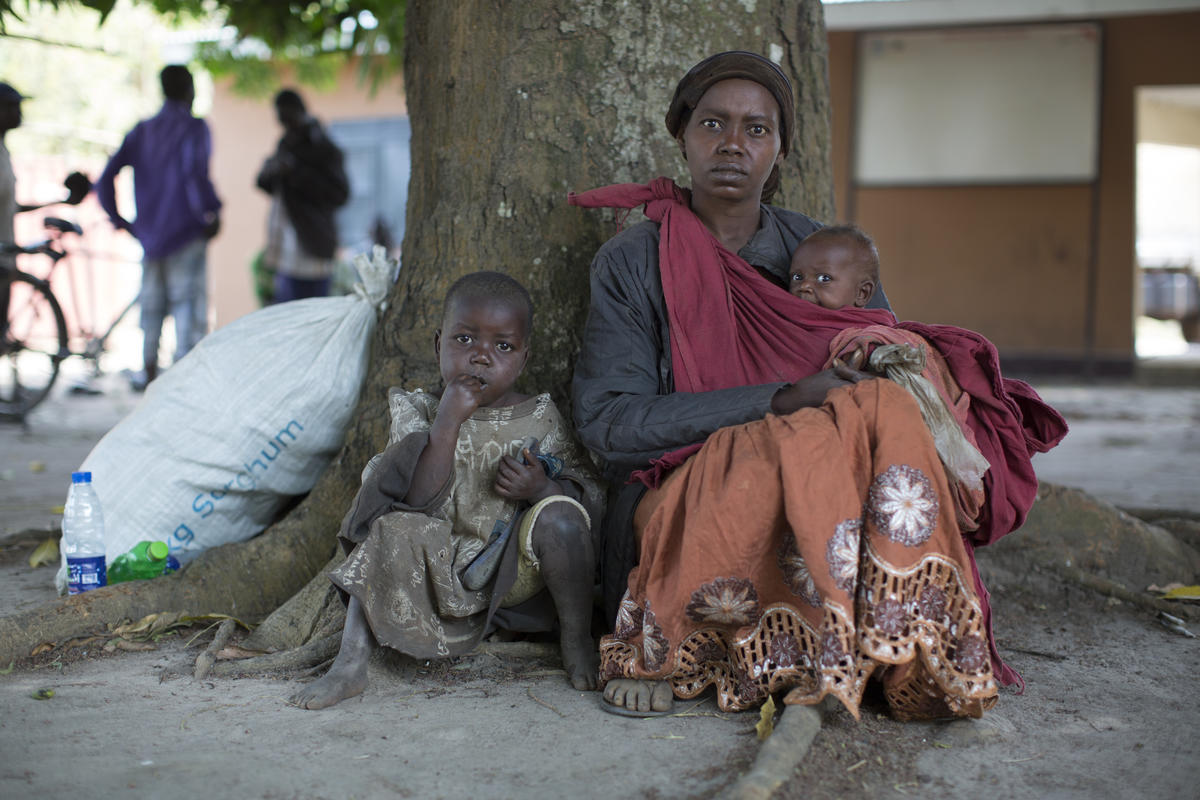Congolese mothers trek to safety in South Sudan

Congolese mothers trek to safety in South Sudan
When armed men attacked her village in Naweneangwa in the Democratic Republic of the Congo, Marie Moses’ motherly instincts screamed: "Go! Get your children to safety!"
The heavily pregnant mother of five could not wait for her husband to return from the fields. She simply gathered up their children and ran into the bush with dozens of her neighbours. In a desperate trek to reach safety in neighbouring South Sudan, Marie was horrified to realise that only four of her children were accounted for. Where was 11-year-old Mborikino?
She searched frantically for her son but he was nowhere in sight. Frantic to get her other children – including her unborn child – to safety, she took the agonizing decision to press on. Exhausted and hungry, the family reached a remote part of Yambio County in South Sudan’s Western Equatoria State, five days later with nearly 200 other refugees.
"Go! Get your children to safety!"
Staff from UNHCR, the UN Refugee Agency and other partners received and assisted the new arrivals. When a UNHCR staffer asked Marie how many children she had, fearing he was dead, she thought of Mborikino with great sadness.
“Four… and one on the way,” she said, looking down at her stomach.
Days later, Marie gave birth to a healthy baby boy, in quarantine. Although grateful for her safe delivery, her mind was still on her missing son – was he simply lost or would her worst fear be confirmed?
Like Marie, expectant mom Suzana Mbogoregu, 34, also had to flee. Her husband Fidele was attending a burial when armed militias attacked their village. At eight months pregnant she knew she had to save herself and her unborn child.
After making the long trek to South Sudan, Suzana gave birth to her baby girl in quarantine, just days after her arrival. She is also grateful for a healthy baby, but the birth is bittersweet without her husband. Still, she does not regret her decision to flee.
“I don’t want to go back. We are safer here,” she said, adding that she has since heard from other new arrivals that her husband is safe.
South Sudan closed its borders in late March as a precaution against COVID-19, but has nevertheless continued to welcome people fleeing conflict. Since January, over 2,100 refugees have streamed in from Sudan, the DRC and the Central African Republic, majority of them women and children. All arrivals are immediately placed under quarantine for 14 days, under the national COVID-19 guidelines.
“I’m glad I made the decision to save the children,”
After the quarantine period, Marie and other refugees prepared to be moved from the quarantine facility to Makpandu refugee camp, which hosts nearly 5,000 refugees.
On the day of the relocation, Marie spotted a familiar face in the crowd – her son, Mborikino.
Mborikino told his mother how he lost sight of her in the chaos of flight. Realizing that he was separated from his family, he hid in the bush with neighbours for four days with no food or shelter, later drifting between groups of fleeing villagers. Along the way, he learned his mother and siblings were alive and in South Sudan and pleaded with some adults to help him across the border and find them.
“I’m glad I made the decision to save the children,” said Marie, as a wave of relief washed over her. “At least we are safe here.”
Nur Issak Kassim, UNHCR’s Head of Office in Yambio highlighted South Sudan’s generosity in letting in refugees, at a time when the country is grappling with its own displacement crisis – nearly 1.7 million South Sudanese are internally displaced – and the COVID-19 pandemic.
“At this very critical time, when someone reaches out for help, it is even more essential to go the extra mile without hesitation,” said Kassim. “This is exactly what South Sudan has been doing, by allowing refugees to find protection in this country. It is the right thing to do.”
Kassim added that in keeping its borders open, South Sudan has ensured that UNHCR and other aid agencies can continue to deliver crucial assistance to the forcibly displaced.
“...what South Sudan has been doing, by allowing refugees in this country. It is the right thing to do.”
“We welcomed the birth of the babies in quarantine and the fact that their mothers could bring new life into a safe environment,” he added. “Is there a better symbol of hope in overcoming today’s challenges?”
So far, South Sudan has confirmed more than 2,400 COVID-19 cases. To mitigate the spread of the new coronavirus, UNHCR, the government and health partner World Vision International are working to keep refugees and their host communities safe.
“Our experience with Ebola in the DRC and South Sudan has prepared us to respond to this influx as precautionary measures against these diseases are similar,” explained Chan Gatluak Deng, the Health and Nutrition Coordinator for World Vision International.
Health workers have been provided with full personal protective equipment and have been trained to ensure that all guidelines and precautionary measures are observed both at the border, and in the camps where arrivals are relocated. This includes temperature checks and monitoring the nutrition and general health of children in quarantine and once moved to the camps.
In Makpandu, Marie and Suzane are slowly adjusting to their new lives. They have their own shelters and their children are healthy. The two mothers are hopeful that they will have a chance at a better future.
“I do miss home because life was good before the attack,” Marie said. “I worry about clothes for myself and my children and I hope I can get land to cultivate so that I can make some money to take care of them.”
Additional reporting by Catherine Wachiaya in Nairobi, Kenya.









